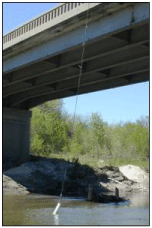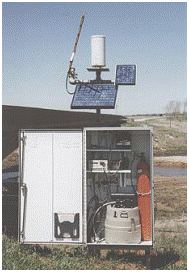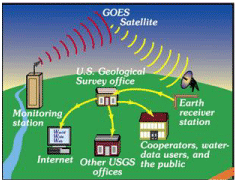Home
About USGS WaterQualityWatch
RTWQ FAQ
State Links to Surrogates and Reports
Technical Resources
Other Links
Search USGS Publications
USGS is updating how statistical information is delivered. WaterWatch and WaterQualityWatch will be retired around February 24, 2026. Explore alternative tools and share feedback at wdfn@usgs.gov.
|
|
What is continuous real-time water quality (RTWQ)?
Water quality monitor in the Little Arkansas River near Sedgwick, KS. 
Stream gage station with automated water sampler. Real-time water quality refers to in-stream water-quality measurements made available on the web in real-time. Water-quality measurements are recorded in time intervals as small as 5 minutes to hourly and are often referred to as continuous. These time-dense (continuous) stream data are made available on the Web in near real-time (updated 4-hour intervals or less) (available at http://waterdata.usgs.gov/nwis). Providing these data in real-time informs the user of stream conditions for various uses and public safety. Real-time water quality information is made possible because of improvements in sensor and data recording technology since the first in-stream sensors were developed in the 1950-60s to directly measure or compute concentrations of many water-quality constituents. Sensors that measure water-quality properties or constituent concentrations are available for specific conductance, pH, water temperature, turbidity, dissolved oxygen, and nitrate. Sensors also are available that measure portions of the electromagnetic spectrum (light) that indicate adsorption or scatter (turbidity, chlorophyll, nitrate, and fluorescence) or sound (acoustic Doppler technology,). In-stream chemical analyzers and portable field laboratories for nitrate and phosphorus also are available. Many additional new sensors are being developed as the need for these data increase. Increasingly, the USGS, in cooperation with other Federal, Tribal, State, and local agencies and non-governmental organizations, has been using innovative real-time monitoring approaches to allow for continuous and immediate water-quality information available in real-time. These in-stream measurements also are used as surrogates for many other constituents in water including, sediment, indicator bacteria and nutrients. In 2014, selected field measurements are available in real-time from more than 2,000 USGS sites (available at http://waterdata.usgs.gov/nwis/current/?type=quality&group_key=NONE) and through this web page interface for the USGS National WaterQualityWatch at http://waterwatch.usgs.gov/wqwatch/. 
Stations record changes in flow and water quality and transmit that data by satellite to USGS offices that are then transferred to the internet. Continuous real-time information on water quality is a vital asset that helps safeguard lives and property and ensures adequate water resources for a healthy State economy. Increased data-collection frequency provides an improved understanding of factors affecting water quality. Continuous real-time water-quality data are needed for decisions regarding drinking water, water treatment, regulatory programs, recreation, and public safety. |
